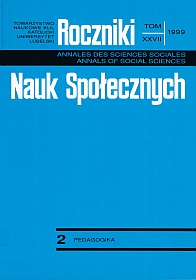Bernardine Educators in the Seraphim College in Radecznica in the Years 1922¬-1939
Abstract
Among the religious who were concerned with educational activity we should also mention Bernardine Fathers. They did not constitute a typical school order, nevertheless - especially during the times of the Commission of National Education - they took up this task and conducted elementary and secondary schools until the first half of the 19th century.
The idea to be involved in the educational and formative job was taken by Bernardine fathers anew in the end of the 19th century. It was due to the fact that a new type of schools had appeared within the whole of the Franciscan order. They were the so called Seraphim colleges which bore an educational-formative character. Apart for the curriculum typical of asecondary school, they had a special formative programme aimed at creating well-formed andeducated priests. The firs Seraphic colleges were set up in Italy and after a few years they were approved by the religious authorities who, by virtues of some laws, recommended to establish them in the religious provinces all over the world.
In the Polish Bernardine province, the only province (out of four) that had survived the partitions, the crisis of religious vocations was also a sore point. Now that the plan to solve it was ready, some attempts were made to initiate a Seraphic college. After many efforts some of which failed the plan succeeded. In 1922 a college at the newly-regained monastery in Radecznica was opened. The main initiator and executor was Fr. Metody Sikora who together with Fr. Jan Duklan Michnar conducted administrative, scientific and formative work. Many devoted and enlightened monks worked in the Seraphim College in Radecznica, aside to lay teachers. Due to administrative regulations issued by the educational authorities, the school had not been approved by the State until the Second World War. Therefore its graduates had to take final examinations at state secondary schools in Lvov, and then in Sokal, where they were registered as “private students”.
The outbreak of the Second World War found the College in its prime. Despite efforts made by Fr. Jan Duklan Michnar to continue didactic and formative activity during the war, the German authorities closed down the school and the formative institute. Fr. Michnar was arrested and put into prison. He returned to Radecznica after the war.
Copyright (c) 1999 Roczniki Nauk Społecznych

This work is licensed under a Creative Commons Attribution-NonCommercial-NoDerivatives 4.0 International License.


